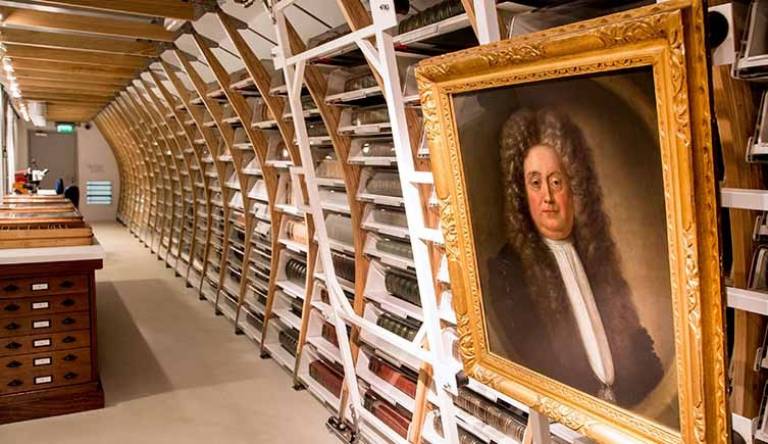Unprecedented access to thousands of artefacts gathered by the 18th century physician, naturalist and prolific collector Sir Hans Sloane, will be available online to everyone for free, thanks to a multi-million pound digital project led by UCL.

Following his death, Sir Hans Sloane's collections formed the basis of the British Museum, Natural History Museum and British Library.
The Sloan Lab: Looking back to build future shared collections will bring Sloane's immense collections, ranging from coins to manuscripts and stuffed animals, which are currently held in a variety of locations, together online for the first time.
Researchers will work with experts and communities to link up Sloane's collections, put them in context for the 21st century, and give new opportunities to search, explore and engage critically with the UK's cultural heritage online.
The Sloane Lab is one of five 'Discovery Projects' sharing £14.5m of Arts and Humanities Research Council (AHRC) funding to democratise and decolonise the UK's culture and heritage collections.
The five projects form the basis of a 5-year research programme called Towards a National Collection (TaNC) aiming to dissolve barriers between thousands of disparate collections.
Researchers will develop new technologies, including the use of artificial intelligence (AI), to open up the contents of museum and collections in ways that are more intuitive and relevant to the way the public and academics want to discover and use them.
The Sloane Lab aims to enrich debate on issues such as: the contested nature of museum collections, the role of digital tools in foregrounding overlooked or ignored processes, like imperialism, colonialism, slavery, loss and destruction, that have shaped the UK's national collections until now.
It will also look at who gets to contribute to, and shape, research on how memory institutions can reach across their institutional boundaries, subject specialities and even countries to offer more and better experiences for audiences, visitors and users. Around 300 people will take part in workshops as part of the exploration.
Principal Investigator and Professor of Digital Humanities Julianne Nyhan (UCL Information Studies and UCL Centre for Digital Humanities), said:
"This project is about mending the broken links between the past and present of the UK's founding collection in the catalogues of the British Museum, Natural History Museum and the British Library. We may even reconnect information about artefacts that was thought to have been lost forever.
"This exciting new research will harness AI and other technologies to devise ways of bringing together information that is relevant to collections in museums, galleries, libraries and archives throughout the UK and the world".
"I am especially excited about the participatory design of this project, and the research with different audiences that this funding will support. Our aim is to intertwine technological and participatory research, community consultation and public engagement to embed diverse community views into the design, execution and validation of the Sloane Lab, and the future of the digital national collection".
As well as the British Museum, Natural History Museum and the British Library, UCL will be working closely with Historic Environment Scotland, Royal Botanic Garden Edinburgh, National Museums of Scotland, Community Archives and Heritage Group, Down County Museum, National Galleries of Scotland, Oxford University Herbaria and the Collecting the West project, which is funded by the Australian Research Council & metaphacts.
UCL researchers are determined that using the digital Sloane Lab will be made as simple as possible, rather than technical skills being a barrier for some audiences. Anyone could potentially curate a new digital exhibition using the resource.
The Towards a National Collection, Sloane Lab investigation team will advertise, through an open call, a series of funded opportunities for 'Community Fellows'. They will be open to all and may generate artist commissions and computer simulations.
Professor Christopher Smith, Executive Chair of the Arts and Humanities Research Council said:
"This moment marks the start of the most ambitious phase of research and development we have ever undertaken as a country in the space where culture and heritage meet AI technology. Towards a National Collection is leading us to a long-term vision of a new national research infrastructure that will be of benefit to collections, researchers and audiences right across the UK."
The investigation is the largest of its kind to be undertaken to date, anywhere in the world. It involves 15 universities and 63 heritage collections and institutions of different scales, with more than 120 individual researchers and collaborators.
Dr Hartwig Fischer, Director of the British Museum said:
"This unprecedented investment of funding by the AHRC into these five projects will allow us to explore what the digital future for our organisations can and should be. A future where anyone can search across collections cared for in different parts of the UK, to pursue their passion for knowledge and understanding, discover their own pasts and answer their own questions.
"Towards a National Collection will strengthen Britain's international leadership in this area. Each project in their own rightly deserves to be celebrated and I cannot wait to see what happens when we bring all this talent and dedication together to build the new future for our shared national collection."
Rebecca Bailey, Programme Director, Towards a National Collection
"Today, for the first time, we can reveal the direction of travel for one of the UK's most collaborative research programmes. Collectively, we aim to dissolve the disciplinary silos that exist in universities and public collections. Our driving mission is to open up global access to the UK's world class collections.
"By harnessing emerging technologies to the creative interdisciplinary talents of our research teams, eventually everyone will have the ability to access an outstanding trove of stories, imagery and research linking together the limitless ideas and avenues in our national collections. From community archives to overlooked artists; from botanical specimens to the ship-wrecked Mary Rose."






